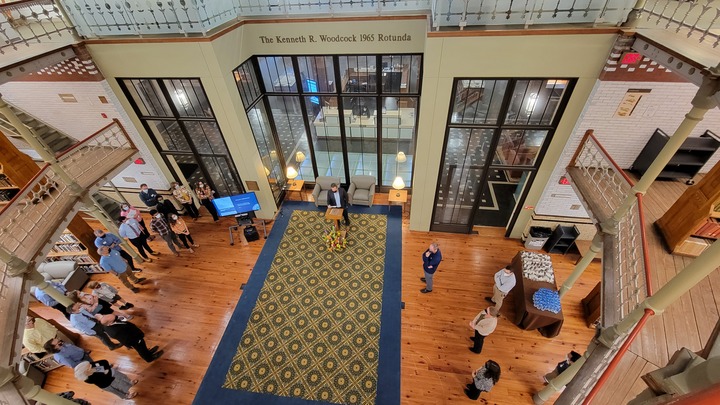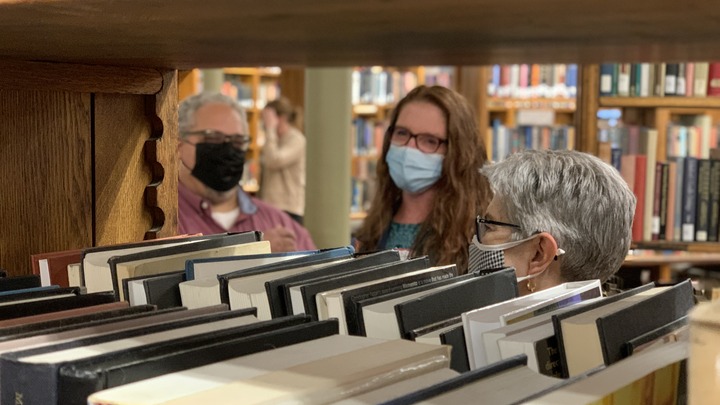On Thursday, September 30, 2021, the Friends of the Lehigh University Libraries hosted its 10th annual Harvest of Ideas reception in the Linderman Library Rotunda for faculty who published or edited a book or composition during the previous year. Judy Parr, president of the Friends of the Lehigh University Libraries, and Greg Reihman, vice provost for library and technology services, presided over the celebration.
The Faculty Authors collection represents a range of scholarly output, and this year's additions include monographs, textbooks, musical works, and more by faculty from all five of Lehigh's colleges. A copy of each book authored by Lehigh faculty is added to Special Collections and noted in the library catalog. Faculty-authored books are also on display in the Linderman Library reading room.
About the Friends
The Friends of the Lehigh University Libraries support engaging library programs, activities, and services to advance the excellence of Lehigh Libraries. To become a member or learn more, visit Joining the Friends.
Faculty honored and their book titles included:
- Deborah Andrus, The Chalumeau Register
- Michael Behe, A Mousetrap for Darwin
- Amanda Brandone, The Emergence and Development of Scientific Thinking during the Early Years: Basic Processes and Supportive Contexts
- Amanda Brown, The Fellowship Church: Howard Thurman and the Twentieth-Century Religious Left
- William Bulman, The Rise of Majority Rule in Early Modern Britain and Its Empire
- Maryann DiEdwardo, Reading Radiantly, Writing Responsibly and Tales of Online Teaching during a Pandemic
- Anthony DiMaggio, Unequal America: class conflict, the news media, and ideology in an era of record inequality /
- Elizabeth Dolan, Placing Charlotte Smith
- George DuPaul, Healthy development in young children: Evidence-based interventions for early education.
- Jodi Eichler-Levine, Painted Pomegranates and Needlepoint Rabbis: How Jews Craft Resilience and Create Community
- Brian Fife, Citizenship in the American Republic
- Mary Foltz, Contemporary American Literature and Excremental Culture: American Sh*t
- Charles F. French, Evil Lives After: The Investigative Paranormal Society, Book 3 and French On English: A Guide To Writing Better Essays Revised
- Ned D. Heindel, Hexenkopf: History, Healing and Hexerei (3rd ed.)
- Marilisa Jiménez Garcia, Side By Side: US Empire, Puerto Rico, and the Roots of American Youth Literature and Culture
- Lee Kern, Individualized Supports for Students with Problem Behaviors: Designing Positive Behavior Plans (2nd ed)
- Michael Kramp, Jane Austen and Critical Theory
- Jackie Krasas, Still a Mother: Noncustodial Mothers, Gendered Institutions, and Social Change
- Olivia Landry, Theatre of Anger: Radical Transnational Performance in Contemporary Berlin
- Tong Soon Lee, Routledge Handbook of Asian Music: Cultural Intersections
- Wenxin Liu, Distributed Energy Management of Electrical Power Systems
- Jack Lule, Globalization and Media: Global Village of Babel (4th ed)
- Allison Mickel, Why Those Who Shovel Are Silent: A History of Local Archaeological Knowledge and Labor
- Ageliki Nicolopoulou, The Emergence and Development of Scientific Thinking during the Early Years: Basic Processes and Supportive Contexts
- Paul Salerni, People, Places, and Pets [CD recording]
- William Schiesser, Mathematical Modeling of Virus Infection: ODE/PDE Analysis in R
- Lorenzo Servitje, Medicine Is War The Martial Metaphor in Victorian Literature and Culture
- Lloyd Steffen, Christianity and Violence
- Vera Stegmann, The Brecht Yearbook, vol. 45.
- Miranda Teboh-Ewungkem, Advances in Mathematical Sciences: AWM Research Symposium, Houston, TX, April 2019 and Infectious Diseases and Our Planet. Mathematics of Planet Earth Series
- Robert Thornton, Fundamentals of Labor Economics (3rd ed)
- Andrew Ward, Strategic Management: From Theory to Practice (2nd ed)
- Nobuko Yamasaki, Prostitutes, Hostesses, and Actresses at the Edge of the Japanese Empire: Fragmenting History
Introducing new author recognition website
Beginning in 2020, the Harvest of Ideas is also celebrated through a virtual recognition website. The site features the works of faculty who published or edited a book or composition during the previous year, alongside content like author interviews, images, and links to the books within the Lehigh Libraries catalog. This site will grow over the years to complement future in-person receptions, allowing the Lehigh community to explore and revisit the work of Lehigh authors.
Photo credit: Sharon Jo '23


